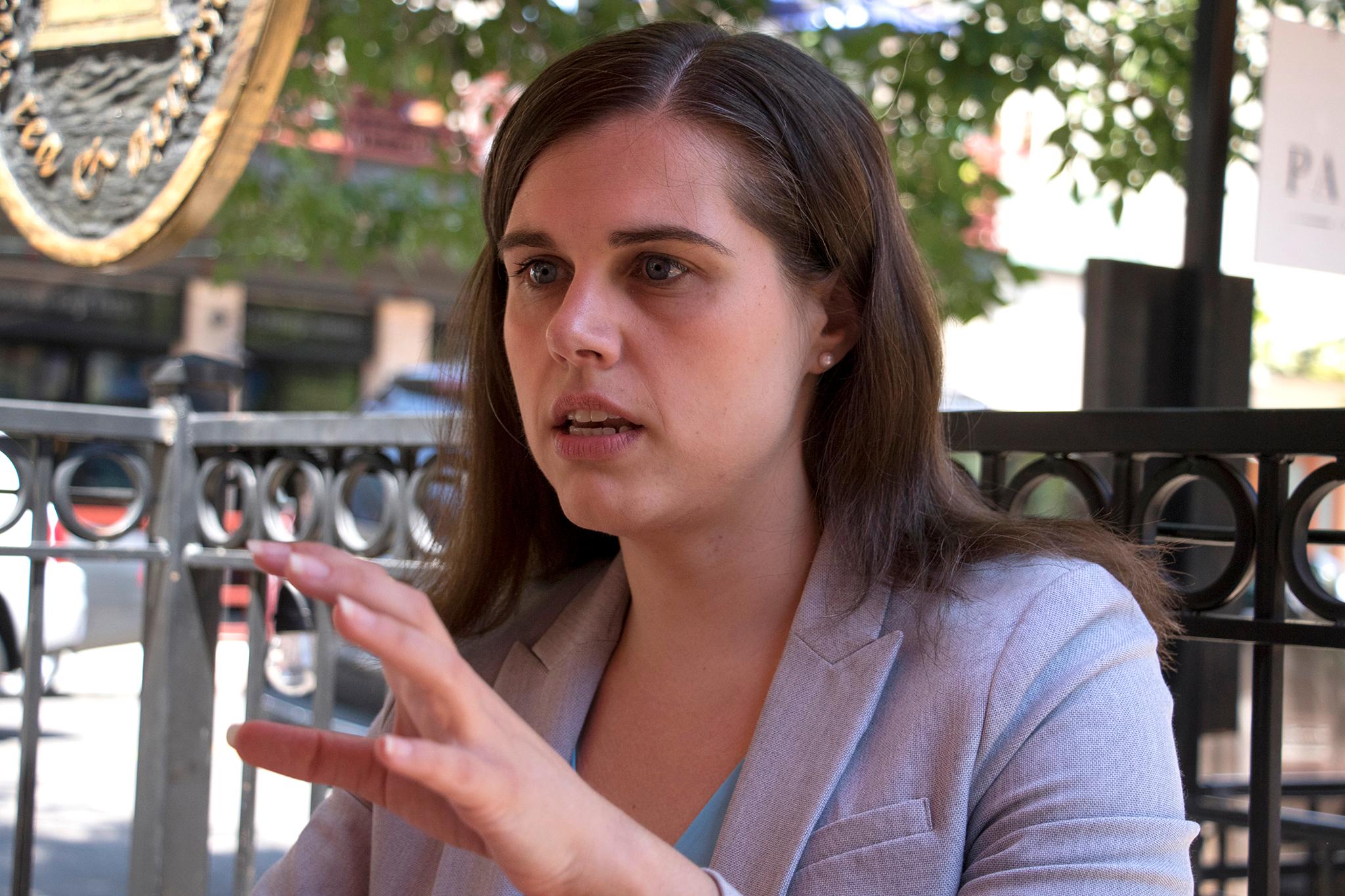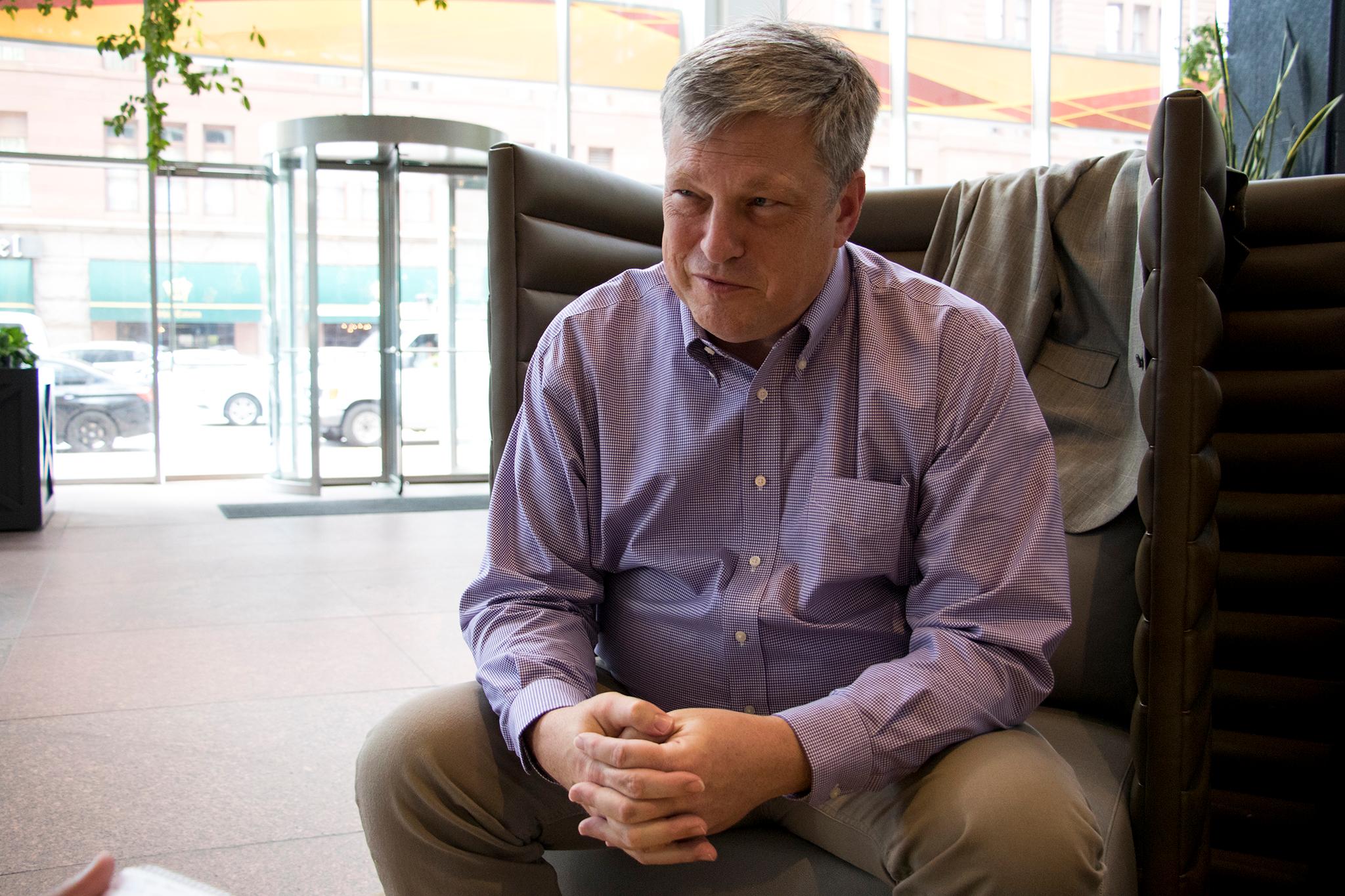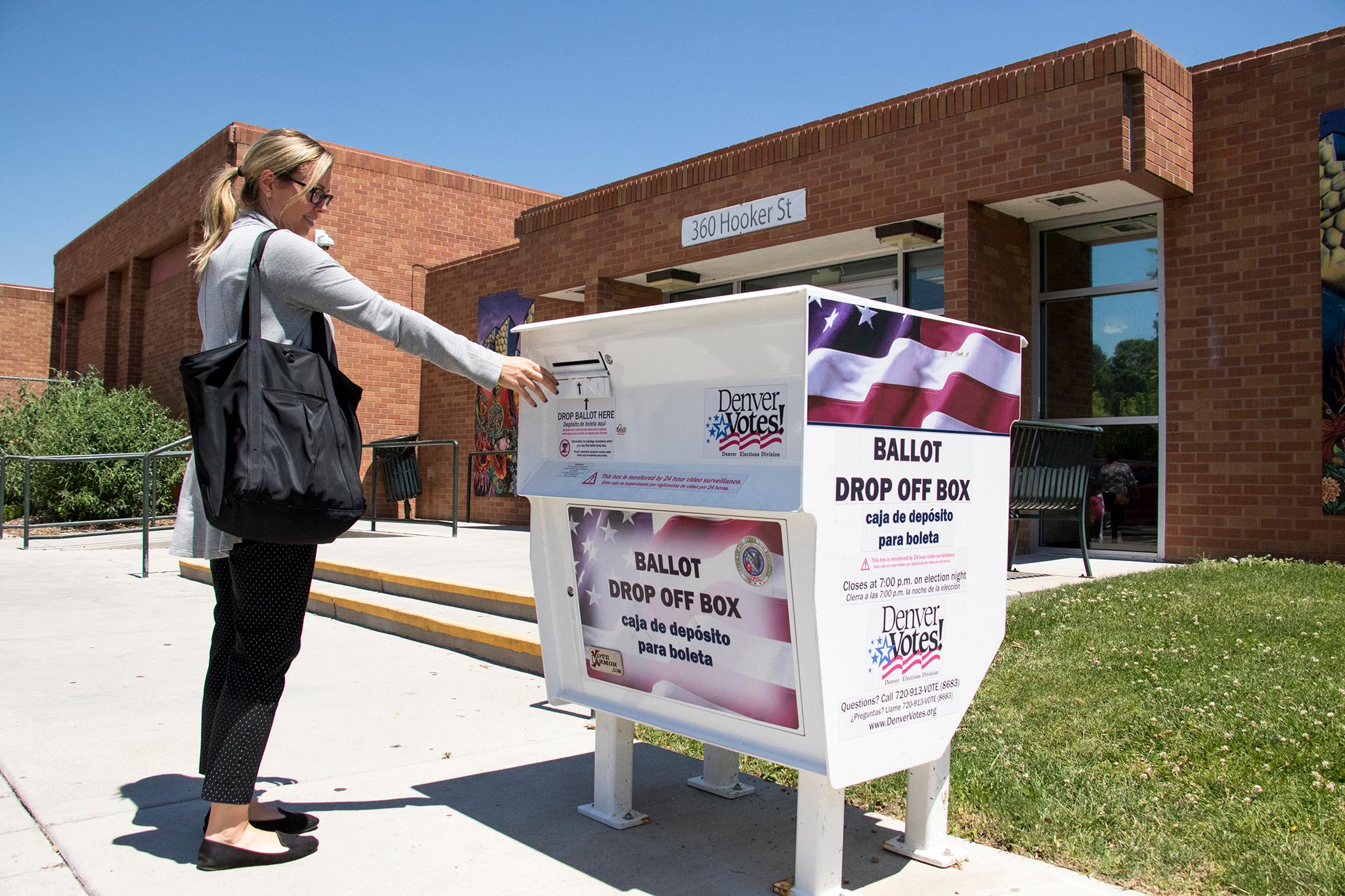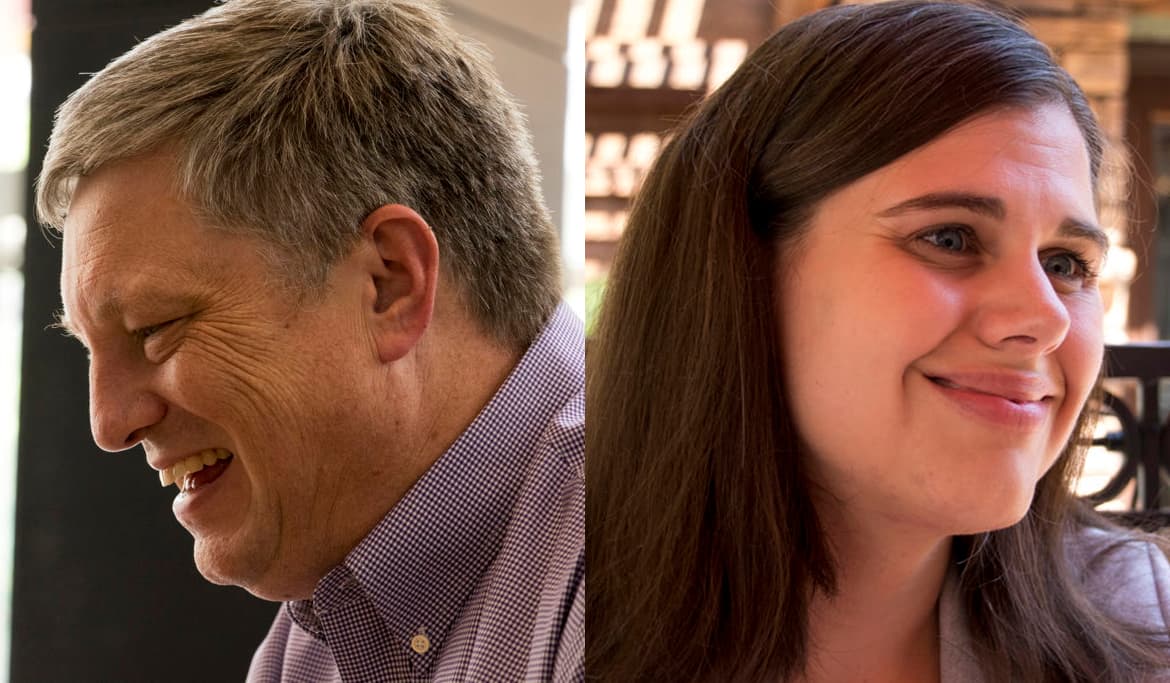Democratic secretary of state candidate Jena Griswold has 510,850 reasons to be optimistic about this fall's election.
That's the number of votes she received during last month’s primary, which was just over 96,000 more votes than incumbent Secretary of State Wayne Williams received in the Republican primary. She called the results shocking, but it’s a promising start for Griswold, who is attempting to unseat a Republican and become the first Democrat in more than half a century to be elected to the seat.
The office oversees the state's elections and business licensing, which Williams said includes both private businesses and nonprofits.
“It’s extremely humbling. I take it very seriously and I am so happy to have all the support, and I think this race is really important,” Griswold said.
Williams, 55, doesn't seem too worried about the difference in numbers. He said he takes every election seriously, though he did chuckle when asked about last month’s difference in results.
“When it comes to the fall, I expect that just like every other election recently, Coloradans will look at individual offices,” Williams said. “Coloradans look at individual races and I feel confident when they do that and look at the record I’ve had as secretary of state and Colorado’s leadership in the nation, I feel optimistic that they will prefer the excellence that we’ve had.”
Griswold, 33, is an attorney and an Estes Park native who launched her campaign a year ago this month. She’s trying to become the first Democrat elected to the Secretary of State’s office since George Baker in the late 1950s. Bernie Buescher is the last Democrat to serve in the office, from 2009 to 2011, but he was appointed.

She has never run for office before, but has experience working for big-wig Democrats. She served as a legislative fellow in U.S. Rep. Diana DeGette’s office, ran Gov. John Hickenlooper's Washington field office from 2013 to 2015, and worked for Organizing for America, an Obama-aligned organization, during the president’s reelection bid in 2012.
Williams will be running on his office's accomplishments, which he said include keeping Colorado a nationwide leader in elections. He said voters want a "high-quality" office that is run fairly and in a non-partisan way.
"We have one of the highest percentages of registered voters in the nation," Williams said. "We have one of the highest percentages of people who vote in the nation. We have, according to the Washington Post, the safest state to vote. We have the cheapest business fees (for) renewal in the nation."
Williams’ decision to comply with a request for voter info from the Trump administration last year will likely be a major talking point during this campaign.
Last year, President Donald Trump created the Advisory Commission on Election Integrity. The commission quickly courted controversy, since it was launched in part to seek out illegal voting that Trump said took place during the November 2016 presidential election he won.
The commission was dissolved in January, and faced lawsuits and resistance from states who didn’t want to provide requested voter information. The requested data included names, addresses, partial social security numbers, party affiliation and felon status for registered voters, according to NPR.
Williams complied with the order, but only sent information that was already publicly available (and still is). He said there is private information on voting files that includes specific birth dates, social security numbers and driver license info.
"We never provide that to anyone," Williams said. "We did not provide it to the presidential advisory commission and don't provide it to the parties and others that subscribe."
He wasn’t very happy about the request: In a letter he sent to the Trump Administration in July 2017, Williams said Colorado’s election system worked just fine and questioned how the info requested would be an effective way to find voter fraud.
"Other information under Colorado law is public, and as an elected official, you don't have the choice to say, 'Well, I don't like you, so you can't have that information,'" Williams said. "Colorado's voting rolls, which include name, address, who voted and the year of your birth are public record."
"Anyone who says the secretary of state should only give voting lists to their friends and allies is arguing for corrupt cronyism that isn't appropriate in the state of Colorado," Williams added.

Still, the damage was done. A Denver Post story from July 2017 reported nearly 3,400 Coloradans had canceled their voter registration in response to the Trump Administration's request for voter info. The figure was a tiny fraction of the more than 3.5 million registered voters in the state, but it still caused concerns for at least one county election official.
Williams’ decision, while not completely compliant with Trump’s request, triggered Griswold’s run.
“He was one of the few secretaries in the nation to say a commission was a good idea,” Griswold said. “I jumped in then because I disagreed with the decision. Look, the commission was automatically sued for breaching federal law and collecting state data. There were multiple lawsuits filed. On top of it, it was being ran by someone with this long and ugly history of disenfranchising hundreds of thousands of people across the country.”
Griswold cited the “thousands of people in Colorado,” who canceled their voter registration as a reason to “make sure that every person, Republican, unaffiliated, Democrat alike, if you’re eligible to vote, we’re not putting up barriers — we’re enfranchising people, not disenfranchising people.”
Some of the people who canceled their voter registrations were moving out of state, Williams said, and others were doing so in protest. He also pointed that out that people were able to cancel their registration easily thanks to policies he helped enact.
"It's important to note that none of them lose the ability to vote, because Colorado allows you to re-register in just a couple of minutes on your smartphone, or you can do it in-person," Williams said
Both candidates want to ensure Colorado’s elections remain among the safest in the country.
That Washington Post story proclaiming Colorado the safest place to cast a ballot is a point of pride for Williams and his office.

Another high point was Colorado successfully withstanding a targeted attack by Russian hackers in 2016 that attempted to breach voter data (Williams said he presumes they were trying to get the voter data that isn't public). Williams credited to the state's security system for helping thwart the attack. Twenty other states were targeted.
"In the last two weeks, we had a team of eight people from (Department of Homeland Security), kind of giving them virtually unrestricted access to our system, making sure that we have the things in place that we need to," Williams said. He recently returned from National Association of Secretaries of State summer conference in Philadelphia, where he said cybersecurity was a big topic.
Williams said the state will use the roughly $6.3 million it received from money authorized by the Help America Vote Act to continue providing cybersecurity enhancements and add training exercises for election officials in all 64 counties.
Griswold said she wants to bolster cybersecurity to ensure that if Colorado becomes a national model for its election security, they're, "an A-plus model for it."
"At the end of the day, I firmly believe that both the privacy and their right to vote deserves to be protected from foreign acts," Griswold said.
Griswold said she wants to make sure there are resources in place to keep cybersecurity up-to-date, which she said she would do by ensuring there are "clear lines of communication" between the office and the Department of Homeland Security. She supported DHS's designation of election systems as critical infrastructure, while Williams criticized the decision due to concerns it could provide the federal government more control over elections.














